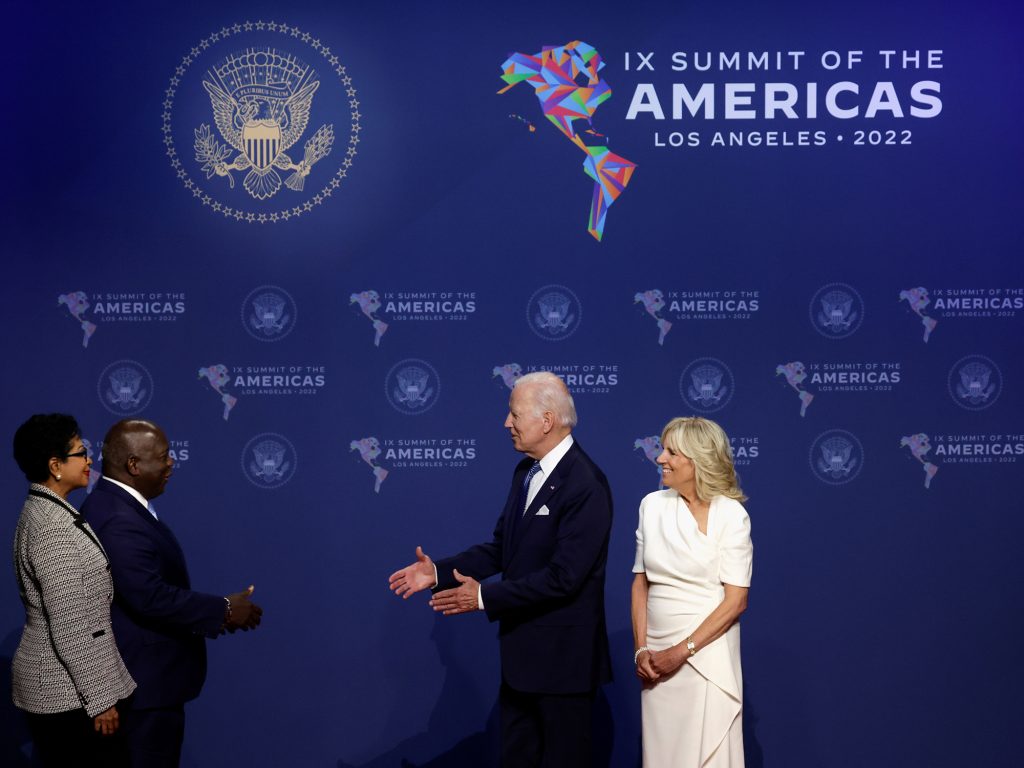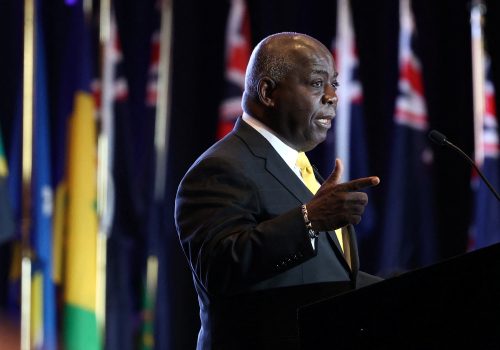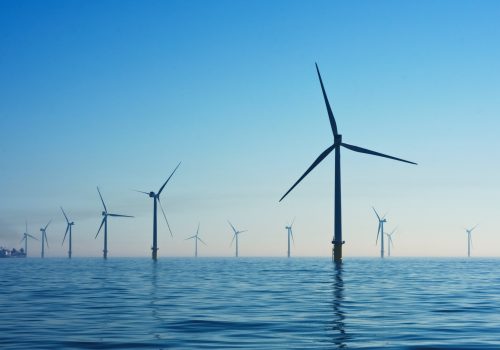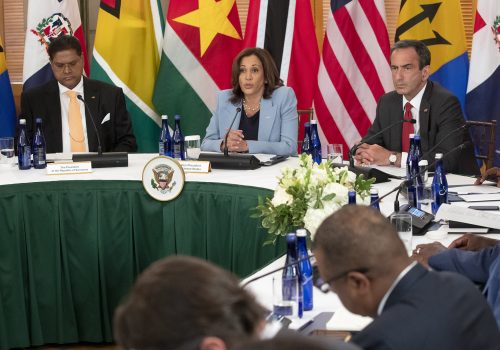Bahamian Prime Minister and Caribbean Community (CARICOM) Chair Philip Davis’s trip to Washington last week shows that, because the United States recently “reengaged” with the Caribbean, 2023 could be transformative for US-Caribbean cooperation. But for that to happen, the United States must change its Caribbean strategy by focusing on making good on its promises, letting the Caribbean lead, and updating security partnerships.
The United States has historically been the Caribbean’s preferred ally, mainly due to proximity. The movement of goods, people, and services to, from, and within the Caribbean often involves the United States. But despite the historical strength of the relationship, there remains a simmering frustration among Caribbean leaders about the United States’ empty and unfulfilled promises and an absence of consistent attention from US officials, which have kept the US-Caribbean relationship from truly deepening. The Caribbean has always seen the potential benefits of its relationship with the United States, but the same cannot be said the other way around.
Last year did see the United States making critical investments in its partnership with the Caribbean. In June, on the sidelines of the Summit of the Americas, US Vice President Kamala Harris announced the US-Caribbean Partnership to Address the Climate Crisis 2030 (PACC 2030)—a new framework created to support climate and energy resilience in the Caribbean. The next day, US President Joe Biden met with Caribbean leaders, and the convening was praised by many across the region. And in a show of the region’s appetite to work with the United States, five Caribbean leaders met with Harris in September to discuss improving future cooperation; at the meeting, the United States announced new commitments to support the region’s energy, food, and financial security.
Last year the United States was in listening mode, and US statements and policies reflected as much. But 2023 promises to be the year in which the United States can finally satisfy some of the Caribbean’s needs and calm its frustrations. Today, there is confidence in the Caribbean that the United States understands the region’s challenges and priorities. Caribbean governments are looking for action, and it will be important that the United States delivers in what is expected to be a pivotal year for the relationship.
With the challenges the region faces, the Caribbean no longer has time to wait on the United States for action—and the United States can’t keep putting it off. Davis, speaking at the Atlantic Council on Tuesday, explained that if the United States fails to pay attention, “someone else will pay the attention.” For example, while China’s influence in the Caribbean has diminished, large projects and new concessional loans are beginning to pop up again, such as a $192 million concessional loan to Guyana to finance a road project and a new agreement with Suriname to expand city surveillance. At the same time, many Caribbean governments have broken from the zero-sum US-China competition narrative that pervades Washington and are building bridges with others including India, the African Union, and the United Arab Emirates.
Furthermore, any further delays mean that potential policy shifts may have a vanishingly short shelf life, as the 2024 presidential election approaches. US policy toward the Caribbean has seen more change than continuity, as each administration brings its own different approach.
What should the United States focus on in 2023?
The United States must understand that showing up is only half the battle. Calls from Caribbean leaders demanding that the United States pay more attention to the region after decades of neglect have translated into more US officials showing up at Caribbean-wide meetings and has resulted in more government and private-sector visits. This should continue but it should not be considered sufficient for the US-Caribbean relationship, which requires policy implementation. Continuing to show up with little to show for it will only create more frustration among Caribbean leaders in the medium to long term.
In 2023, the United States should focus on three key areas:
The United States should fulfill its PACC 2030 promises. PACC 2030 requires a full interagency effort, so the United States should ensure the Treasury, State Department, and vice president’s office are aligned on how to move forward with this massive undertaking. US officials should work with Congress on legislation that enshrines PACC 2030 for the long term. Lawmakers should also allocate funding to each of PACC 2030’s four pillars—development finance, clean-energy projects, local capacity-building, and deepening collaboration.
Second, the United States should let the Caribbean lead in areas for which it has in-house expertise and support the Caribbean’s positions in multilateral organizations. Most Caribbean countries are dependent on imports for energy and food, making the supply squeezes caused by Russia’s war in Ukraine particularly devastating for the region. While US help is needed, regional leaders are pushing forward on their own solutions. CARICOM’s plan to reduce the region’s food-import bill by 25 percent by 2025 is one such example. Here, the United States does not need a food-security policy for the region but instead should provide technical expertise and financing for Caribbean-led solutions.
US advocacy for Caribbean and small-state priorities in multilateral meetings that include other wealthy and powerful actors, such as the Group of Twenty (G20) and international financial institutions, can move the needle on solutions to these countries’ economic challenges. International support is needed in tackling the Caribbean’s struggles with debt relief, financial de-risking (the loss of correspondent banking relations with overseas banks), and poor access to concessional financing. For the United States, there are inherent benefits because slow Caribbean economic growth drives migration; plus, stronger economies can help preserve the strength of the region’s democracies.
Finally, the United States should address the region’s growing security concerns. Rightfully, climate, energy, and financial resilience have all featured prominently in the Biden administration’s Caribbean policies, but this has also meant that security challenges have lost prominence. Crime, violence, and gang activity have skyrocketed across the region over the past year. Trinidad and Tobago’s homicide rate in 2022 reached its highest level in more than a decade, and a rise in gang activity pushed Jamaica to institute a state of emergency. And per capita, Saint Lucia now ranks in the top 5 of highest homicide rates in the hemisphere.
This increase has been fueled in part by small-arms trafficking, with illicit small arms being imported into the Caribbean from the United States. Caribbean islands have limited security forces with numerous unmanned ports of entry, making the region a hotbed for small arms trafficking. Increased US-Caribbean security cooperation is needed. But first, US policies and projects—such as the Caribbean Basin Security Initiative (CBSI)—should be updated to reflect the region’s current security concerns. The CBSI barely touches on illicit small arms, for example; the United States should work this year with Congress and the Department of Defense to refocus its current security efforts.
After the progress of 2022, Caribbean leaders expect action instead of just more promises. The region knows that to survive climate change, rising food inflation, and its vulnerability to global economic shocks, it’ll need to leverage a US partnership that is backed by technical and financial resources. It adds up to a make-or-break year for US-Caribbean relations. As the United States begins to show attention to the Caribbean and regional leaders continue to welcome more US support, the timing has never been better to see real action. Without it, Caribbean nations could seek out more willing partners.
Wazim Mowla is the associate director of the Caribbean Initiative at the Adrienne Arsht Latin America Center.
Further reading
Wed, Jan 18, 2023
Bahamian prime minister urges action on climate change, financial inclusion, and regional cooperation
New Atlanticist By
Philip Davis, prime minister of The Bahamas and chair of the Caribbean Community, told the Atlantic Council that the region is ready to take action on improving energy security and economic development.
Tue, Sep 20, 2022
PACC2030: Quick wins for a US-Caribbean partnership on climate and energy resilience
Issue Brief By Wazim Mowla, Riyad Insanally
PACC2030’s success is crucial for CARICOM countries and the United States, and it needs to deliver in the short term to generate confidence that the United States is committed to a sustainable partnership.
Thu, Sep 15, 2022
Is US-Caribbean diplomacy finally on the right track?
New Atlanticist By
We reached out to our experts from the Adrienne Arsht Latin America Center to break down the White House's new commitments and how this diplomatic relationship can improve in the future.
Image: US President Joe Biden and first lady Jill Biden welcome Bahamas's Prime Minister Philip Edward Davis and his wife Anne-Marie Davis during the Summit of the Americas, in Los Angeles, California, on June 8, 2022. Photo via REUTERS/Daniel Becerril.



